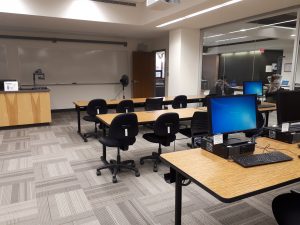On October 12 2018, Dr. Gabrielle Appleby, an associate professor of Law at the University of New South Wales in Sydney, Australia, visited UVic and gave on talk on Indigenous law in Australia. Her talk focused on the 2017 release of the Uluru Statement from the Heart, a consensus document created as a result of a constitutional convention of Aboriginal and Torres Strait Islander peoples. This document calls for a First Nations voice when drafting policy and legislation affecting Aboriginal and Torres Strait Islander peoples.
The Australian government has a history of discrimination against Aboriginal and Torres Strait Islander people. Australia was settled using the doctrine of terra nullius, and as a result no treaties were signed with Aboriginal People and Torres Strait Islanders. When the Constitution was written in 1903, Aboriginal people and Torres Strait islanders were actively excluded by the ‘races power clause’, which allowed the government to create legislation that applied to everyone but Aboriginal peoples, and census clause, to ensure that Aboriginal peoples were not counted as part of the communities they were living in. The reasoning behind this exclusion was that the Aboriginal and Torres Islander peoples were considered a ‘dying race’. These exclusions were removed in 1967 following a referendum for Indigenous rights. This referendum repealed the census clause, and ensured that federal legislation included Aboriginal and Torres Strait Islanders. While the exclusionary parts of the constitution were removed, no inclusionary parts were added.
The races clause allowed for positive legislation to be passed such as Aboriginal and Torres Strait Islander Heritage Protection Act and the Native Title Act, but also opened the door for it to be used against them. The discriminatory use of the races clause highlighted the fact that there is no constitutional protection against discrimination in Australia. There was a push in the 1990s for constitutional reform, which followed into the 2000s. In 2007, both presidential candidates promised constitutional reform. In 2008, an apology for the Stolen Generations (the result of practices similar to Canada’s residential schools and sixties scoop) was issued. The momentum for constitutional reform continued. In 2012, an Expert Panel on Constitutional Recognition of Aboriginal and Torres Strait Islander peoples presented its recommendation for a non-discrimination clause to the government. This report, along with another report of a Joint Summit Committee in 2015, both recommended the addition of a non-discrimination clause to the constitution. They were rejected or ignored by the Australian government.
For the Uluru Statement, a different approach was used. An Indigenous Steering Committee was created to find the best way to consult with Aboriginal people. Thirteen communities were consulted, with each consultation consisting of 100 people from each community as chosen by the community leaders. Ten representatives were then elected to go to Uluru. Uluru is a place of great spiritual significance to the Aboriginal and Torres Strait Islander peoples, and was seen as a fitting place to convene to discuss what Indigenous constitutional reform would entail. Only Aboriginal and Torres Strait Islander people were allowed into the convention. A live stream was shown and non-Indigenous people were consulted virtually for their expertise. The convention resulted in the Uluru Statement from the Heart – which calls for one constitutional reform – a First Nations voice in policy and law making for legislation relating to Indigenous peoples. The Statement also called for the creation of the Makarrata Commission, which would oversee a modern treaty process and national truth-telling. The Statement was clear in wanting a political voice and not just legal redress for discriminatory legislation.
The Uluru Statement was rejected by the government. That being said, six months after the rejection, the joint parliamentary committee on the constitutional recognition of Aboriginal and Torres Strait Islander peoples was created, and was asked to consider the Uluru Statement. The joint parliamentary committee
Implementation of Uluru Statement has yet to be decided. The best way forward would include developing additional dialogues with the communities to discuss how the voice would be implemented.
Below are resources on the Uluru Statement, as well as on the Australian Constitution and Indigenous rights.

